| Listing 1 - 10 of 26 | << page >> |
Sort by
|
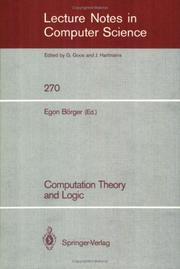
ISBN: 3540181709 0387181709 3540477950 Year: 1987 Volume: vol 270 Publisher: Berlin London Paris Springer
Abstract | Keywords | Export | Availability | Bookmark
 Loading...
Loading...Choose an application
- Reference Manager
- EndNote
- RefWorks (Direct export to RefWorks)
This volume contains 37 invited research papers collected in memory of Dieter Rödding, who is known for his work on the classification of recursive functions, on reduction classes, on the spectrum problem and on the complexity of cardinality quantifiers in predicate logic and in arithmetical hierarchy. He was one of the first to pursue the interaction of logic and computer science. The volume reflects the wide spectrum of Dieter Rödding's scientific interests.
Computer science --- 681.3*F0 --- 681.3*G2 --- 681.3*K2 --- Computerwetenschap--?*F0 --- Discrete mathematics (Mathematics of computing) --- History of computing: hardware; people; software; systems; theory --- Machine theory. --- Computational complexity. --- 681.3*K2 History of computing: hardware; people; software; systems; theory --- 681.3*G2 Discrete mathematics (Mathematics of computing) --- Information theory. --- Computer science. --- Theory of Computation. --- Computation by Abstract Devices. --- Informatics --- Science --- Communication theory --- Communication --- Cybernetics

ISBN: 0881750840 Year: 1988 Publisher: Rockville, Md Computer Science Press
Abstract | Keywords | Export | Availability | Bookmark
 Loading...
Loading...Choose an application
- Reference Manager
- EndNote
- RefWorks (Direct export to RefWorks)
Computer science --- Informatics --- Science --- Computer science.
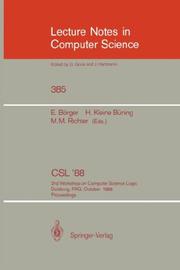
ISBN: 354051659X 038751659X 354046736X Year: 1989 Volume: vol 385 Publisher: Berlin New York Paris Tokyo Springer
Abstract | Keywords | Export | Availability | Bookmark
 Loading...
Loading...Choose an application
- Reference Manager
- EndNote
- RefWorks (Direct export to RefWorks)
This volume contains the papers which were presented at the second workshop "Computer Science Logic" held in Duisburg, FRG, October 3-7, 1988. These proceedings cover a wide range of topics both from theoretical and applied areas of computer science. More specifically, the papers deal with problems arising at the border of logic and computer science: e.g. in complexity, data base theory, logic programming, artificial intelligence, and concurrency. The volume should be of interest to all logicians and computer scientists working in the above fields.
Computer science --- 681.3*H2 --- 681.3*D3 --- 681.3*F --- 681.3*I1 --- 681.3*I2 --- Database management: security; integrity; protection--See also {?681.5*E5} --- Programming languages --- Theory of computation --- Algebraic manipulation (Computing methodologies) --- Artificial intelligence. AI --- 681.3*I2 Artificial intelligence. AI --- 681.3*I1 Algebraic manipulation (Computing methodologies) --- 681.3*F Theory of computation --- 681.3*D3 Programming languages --- 681.3*H2 Database management: security; integrity; protection--See also {?681.5*E5} --- Computer network architectures. --- Logic, Symbolic and mathematical. --- Computer science. --- Logic design. --- Combinatorics. --- Computer System Implementation. --- Mathematical Logic and Foundations. --- Programming Languages, Compilers, Interpreters. --- Logics and Meanings of Programs. --- Mathematical Logic and Formal Languages. --- Combinatorics --- Algebra --- Mathematical analysis --- Design, Logic --- Design of logic systems --- Digital electronics --- Electronic circuit design --- Logic circuits --- Machine theory --- Switching theory --- Informatics --- Science --- Algebra of logic --- Logic, Universal --- Mathematical logic --- Symbolic and mathematical logic --- Symbolic logic --- Mathematics --- Algebra, Abstract --- Metamathematics --- Set theory --- Syllogism --- Architectures, Computer network --- Network architectures, Computer --- Computer architecture
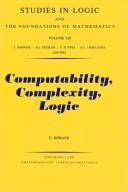
ISBN: 0444874062 9786611790639 128179063X 008088704X 9780444874061 9780080887043 9781281790637 Year: 1989 Volume: 128 Publisher: Amsterdam: North-Holland,
Abstract | Keywords | Export | Availability | Bookmark
 Loading...
Loading...Choose an application
- Reference Manager
- EndNote
- RefWorks (Direct export to RefWorks)
The theme of this book is formed by a pair of concepts: the concept of formal language as carrier of the precise expression of meaning, facts and problems, and the concept of algorithm or calculus, i.e. a formally operating procedure for the solution of precisely described questions and problems. The book is a unified introduction to the modern theory of these concepts, to the way in which they developed first in mathematical logic and computability theory and later in automata theory, and to the theory of formal languages and complexity theory. Apart from considering the fundamental themes
Berekeningen [Ingewikkeldheid van ] --- Calcul [Complexité de ] --- Complexité de calcul --- Computable functions --- Computational complexity --- Fonctions recurrentes --- Functies [Rekenkundige ] --- Ingewikkeldheid van berekeningen --- Logic [Symbolic and mathematical ] --- Logica [Symbolische en wiskundige ] --- Logique symbolique et mathémathique --- Logic, Symbolic and mathematical --- Fonctions calculables --- Complexité de calcul (Informatique) --- Logique symbolique et mathématique --- Computational Complexity --- Logic, symbolic and mathematical --- Algebra of logic --- Logic, Universal --- Mathematical logic --- Symbolic and mathematical logic --- Symbolic logic --- Mathematics --- Algebra, Abstract --- Metamathematics --- Set theory --- Syllogism --- Complexity, Computational --- Electronic data processing --- Machine theory --- Computability theory --- Functions, Computable --- Partial recursive functions --- Recursive functions, Partial --- Constructive mathematics --- Decidability (Mathematical logic) --- Computable functions. --- Computational complexity. --- Logic, Symbolic and mathematical.
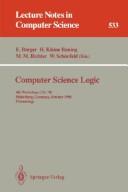
ISBN: 3540544879 0387544879 3540384014 Year: 1991 Volume: vol 533 Publisher: Berlin New York Springer-Verlag
Abstract | Keywords | Export | Availability | Bookmark
 Loading...
Loading...Choose an application
- Reference Manager
- EndNote
- RefWorks (Direct export to RefWorks)
The workshop Computer Science Logic '90 was held at the Max-Planck-Haus in Heidelberg, Germany, October 1-5, 1990. It was the fourth in a series of worskhops, following CSL '89 at the University of Kaiserslautern (see LNCS 440), CSL '88 at the University of Duisberg (see LNCS 385), and CSL '87 at the University of Karlsruhe (see LNCS 329). This volume contains 24 papers, chosen by means of a review procedure from the 35 papers presented at the workshop, some of which were invited and some selected from a total of 89 submissions. The papers cover a wide range of topics arising from the applications of logic to computer science.
681.3*H2 --- Computer science --- -Logic, Symbolic and mathematical --- -681.3*D3 --- 681.3*G2 --- 681.3*I2 --- Algebra of logic --- Logic, Universal --- Mathematical logic --- Symbolic and mathematical logic --- Symbolic logic --- Mathematics --- Algebra, Abstract --- Metamathematics --- Set theory --- Syllogism --- Informatics --- Science --- Database management: security; integrity; protection--See also {?681.5*E5} --- Congresses --- Programming languages --- Discrete mathematics (Mathematics of computing) --- Artificial intelligence. AI --- 681.3*I2 Artificial intelligence. AI --- 681.3*G2 Discrete mathematics (Mathematics of computing) --- 681.3*D3 Programming languages --- 681.3*H2 Database management: security; integrity; protection--See also {?681.5*E5} --- Logic, Symbolic and mathematical --- 681.3*D3 --- Logic [Symbolic and mathematical ] --- Computer science - Congresses. --- Logic, Symbolic and mathematical - Congresses. --- Logic, Symbolic and mathematical. --- Mathematics. --- Information theory. --- Logic design. --- Computer science. --- Computer software. --- Mathematical Logic and Foundations. --- Applications of Mathematics. --- Theory of Computation. --- Logics and Meanings of Programs. --- Mathematical Logic and Formal Languages. --- Algorithm Analysis and Problem Complexity. --- Software, Computer --- Computer systems --- Design, Logic --- Design of logic systems --- Digital electronics --- Electronic circuit design --- Logic circuits --- Machine theory --- Switching theory --- Communication theory --- Communication --- Cybernetics --- Math
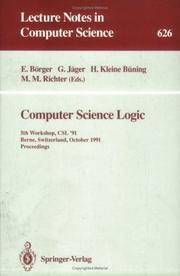
ISBN: 354055789X 038755789X 3540472851 Year: 1992 Volume: vol 626 Publisher: Berlin New York London Springer-Verlag
Abstract | Keywords | Export | Availability | Bookmark
 Loading...
Loading...Choose an application
- Reference Manager
- EndNote
- RefWorks (Direct export to RefWorks)
This volume presents the proceedings of the workshop CSL '91 (Computer Science Logic) held at the University of Berne, Switzerland, October 7-11, 1991. This was the fifth in a series of annual workshops on computer sciencelogic (the first four are recorded in LNCS volumes 329, 385, 440, and 533). The volume contains 33 invited and selected papers on a variety of logical topics in computer science, including abstract datatypes, bounded theories, complexity results, cut elimination, denotational semantics, infinitary queries, Kleene algebra with recursion, minimal proofs, normal forms in infinite-valued logic, ordinal processes, persistent Petri nets, plausibility logic, program synthesis systems, quantifier hierarchies, semantics of modularization, stable logic, term rewriting systems, termination of logic programs, transitive closure logic, variants of resolution, and many others.
681.3*H2 --- Computer science --- -Logic, Symbolic and mathematical --- -681.3*D3 --- 681.3*F --- 681.3*G2 --- 681.3*I2 --- Algebra of logic --- Logic, Universal --- Mathematical logic --- Symbolic and mathematical logic --- Symbolic logic --- Mathematics --- Algebra, Abstract --- Metamathematics --- Set theory --- Syllogism --- Informatics --- Science --- Database management: security; integrity; protection--See also {?681.5*E5} --- Congresses --- Programming languages --- Theory of computation --- Discrete mathematics (Mathematics of computing) --- Artificial intelligence. AI --- 681.3*I2 Artificial intelligence. AI --- 681.3*G2 Discrete mathematics (Mathematics of computing) --- 681.3*F Theory of computation --- 681.3*D3 Programming languages --- 681.3*H2 Database management: security; integrity; protection--See also {?681.5*E5} --- Logic [Symbolic and mathematical ] --- Computer science - Congresses. --- Logic, Symbolic and mathematical - Congresses. --- Information theory. --- Logic, Symbolic and mathematical. --- Logic design. --- Computer science. --- Computer software. --- Theory of Computation. --- Mathematical Logic and Foundations. --- Logics and Meanings of Programs. --- Mathematical Logic and Formal Languages. --- Algorithm Analysis and Problem Complexity. --- Computation by Abstract Devices. --- Software, Computer --- Computer systems --- Design, Logic --- Design of logic systems --- Digital electronics --- Electronic circuit design --- Logic circuits --- Machine theory --- Switching theory --- Communication theory --- Communication --- Cybernetics --- Logic, Symbolic and mathematical --- Logique mathématique --- Logique mathématique. --- -Congresses --- Logique mathématique.
Book
ISBN: 9780198538547 0198538545 Year: 1995 Publisher: Oxford: Clarendon,
Abstract | Keywords | Export | Availability | Bookmark
 Loading...
Loading...Choose an application
- Reference Manager
- EndNote
- RefWorks (Direct export to RefWorks)
Book
ISBN: 3540897623 3540897615 Year: 2008 Publisher: Berlin, Heidelberg : Springer Berlin Heidelberg : Imprint: Springer,
Abstract | Keywords | Export | Availability | Bookmark
 Loading...
Loading...Choose an application
- Reference Manager
- EndNote
- RefWorks (Direct export to RefWorks)
This tutorial presents a collection of research papers on themes discussed at the Lipari Summer School on Advances in Software Engineering, held on Lipari Island, Italy, in July 2007. It was the 19th in a well-known series of annual international schools, addressed at computer science researchers. The courses dealt with domain and requirements engineering, high-level modelling, software product line techniques, evolvable software, the evolution of service-oriented software architectures, Web services, and security in such evolving distributed systems. The nine revised full papers presented were carefully reviewed and selected by 21 reviewers. The papers are organized in topical sections on foundations and methodology, service oriented architecture and web services, software technology, and security. This book is written with the intent to produce a state-of-the-art compendium of recent advances in software engineering.
Computer science. --- Software engineering. --- Computer programming. --- Programming languages (Electronic computers). --- Computer Science. --- Software Engineering/Programming and Operating Systems. --- Programming Languages, Compilers, Interpreters. --- Software Engineering. --- Programming Techniques. --- Computer software engineering --- Engineering --- Informatics --- Science --- Computer languages --- Computer program languages --- Computer programming languages --- Machine language --- Electronic data processing --- Languages, Artificial --- Computers --- Electronic computer programming --- Electronic digital computers --- Programming (Electronic computers) --- Coding theory --- Programming --- Information Technology --- Software Engineering --- Software engineering --- Programming languages (Electronic computers)
Book
ISBN: 3662566419 3662566397 Year: 2018 Publisher: Berlin, Heidelberg : Springer Berlin Heidelberg : Imprint: Springer,
Abstract | Keywords | Export | Availability | Bookmark
 Loading...
Loading...Choose an application
- Reference Manager
- EndNote
- RefWorks (Direct export to RefWorks)
This book uses a variety of applications to illustrate a modeling method that helps practitioners to manage complex software-intensive systems. The proposed method relies on the combination of its abstraction concept and its operational character, with behavioral models in the precise and simple form of Abstract State Machines (ASMs). The book introduces both the modeling method (Part I) and the available tool support (Part II): In Part I the authors detail (using numerous examples) how to construct, explain, debug, explore, extend and reuse accurate system design models, starting from scratch. Only an elementary knowledge of common mathematical (including set-theoretic) notation and some basic experience with computational processes (systems, programs, algorithms) is assumed. Part II then shows how the modeling method can be supported by implementing tools that make design models executable and debuggable. To illustrate how to build, debug and maintain systems and to explain their construction in a checkable manner, a general, problem-oriented refinement method is adopted to construct system models from components. The method starts with abstract models and refines them step by step, incrementally adding further details that eventually lead to code. Intended for practitioners who build software intensive systems, and students specializing in software engineering, it can be used both for self-study and for teaching, and it can serve as a reference book. Exercises are included to help readers check their understanding of the explained concepts. For many models defined in the book, refinements to executable versions can be downloaded for experimental validation from the book’s website at http://modelingbook.informatik.uni-ulm.de.
Computer software --- Mathematical models. --- Computer science. --- Management information systems. --- Industrial management. --- Software engineering. --- Mathematical logic. --- Computer Science. --- Software Engineering. --- Mathematical Logic and Formal Languages. --- Business Process Management. --- Algebra of logic --- Logic, Universal --- Mathematical logic --- Symbolic and mathematical logic --- Symbolic logic --- Mathematics --- Algebra, Abstract --- Metamathematics --- Set theory --- Syllogism --- Computer software engineering --- Engineering --- Business administration --- Business enterprises --- Business management --- Corporate management --- Corporations --- Industrial administration --- Management, Industrial --- Rationalization of industry --- Scientific management --- Management --- Business --- Industrial organization --- Computer-based information systems --- EIS (Information systems) --- Executive information systems --- MIS (Information systems) --- Sociotechnical systems --- Information resources management --- Informatics --- Science --- Communication systems --- Software, Computer --- Computer systems
Digital
ISBN: 9783662566411 Year: 2018 Publisher: Berlin, Heidelberg Springer
Abstract | Keywords | Export | Availability | Bookmark
 Loading...
Loading...Choose an application
- Reference Manager
- EndNote
- RefWorks (Direct export to RefWorks)
This book uses a variety of applications to illustrate a modeling method that helps practitioners to manage complex software-intensive systems. The proposed method relies on the combination of its abstraction concept and its operational character, with behavioral models in the precise and simple form of Abstract State Machines (ASMs). The book introduces both the modeling method (Part I) and the available tool support (Part II): In Part I the authors detail (using numerous examples) how to construct, explain, debug, explore, extend and reuse accurate system design models, starting from scratch. Only an elementary knowledge of common mathematical (including set-theoretic) notation and some basic experience with computational processes (systems, programs, algorithms) is assumed. Part II then shows how the modeling method can be supported by implementing tools that make design models executable and debuggable. To illustrate how to build, debug and maintain systems and to explain their construction in a checkable manner, a general, problem-oriented refinement method is adopted to construct system models from components. The method starts with abstract models and refines them step by step, incrementally adding further details that eventually lead to code. Intended for practitioners who build software intensive systems, and students specializing in software engineering, it can be used both for self-study and for teaching, and it can serve as a reference book. Exercises are included to help readers check their understanding of the explained concepts. For many models defined in the book, refinements to executable versions can be downloaded for experimental validation from the book’s website at http://modelingbook.informatik.uni-ulm.de.
Mathematical logic --- Business management --- Computer science --- Programming --- Computer. Automation --- MIS (management informatie systeem) --- computers --- organisatiecultuur --- wiskunde --- software engineering --- logica --- computerkunde
| Listing 1 - 10 of 26 | << page >> |
Sort by
|

 Search
Search Feedback
Feedback About UniCat
About UniCat  Help
Help News
News